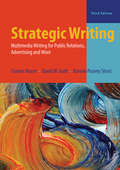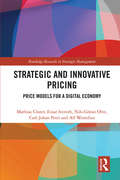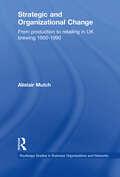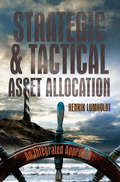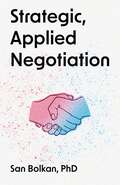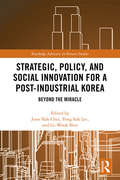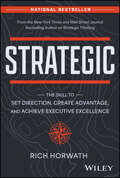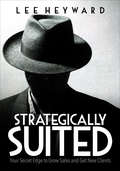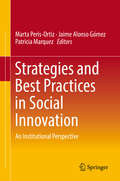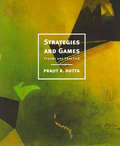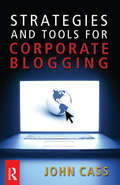- Table View
- List View
Strategic Writing: Multimedia Writing for Public Relations, Advertising, and More
by Charles Marsh David W. Guth Bonnie Poovey ShortIn its third edition, Strategic Writing emphasizes the strategic, goal-oriented mission of high-quality media and public relations writing with clear, concise instructions for more than 40 types of documents. This multidisciplinary text covers writing for public relations, advertising, sales and marketing, and business communication. Featuring a spiral binding, numerous examples and a user-friendly "recipe" approach, Strategic Writing is ideal for public relations writing classes that include documents from other disciplines.
Strategic and Innovative Pricing: Price Models for a Digital Economy (Routledge Research in Strategic Management)
by Einar Iveroth Nils-Göran Olve Carl-Johan Petri Mathias Cöster Alf WesteliusThis book provides a concrete guide on how to execute strategic pricing to excel in an increasingly dynamic and digitised business environment, while developing and deepening relations with contract partners. The secret lies in crafting innovative price models that reward joint value creation in accordance with the business model, rather than engaging in confrontative zero-sum pricing reasoning. Strategic and Innovative Pricing: Price Models for a Digital Economy provides hands-on tools that are applied on three interconnected levels of analysis. It illustrates how to explore the business ecology to understand its dynamics and how digitisation enables it to prosper and demonstrates how to construct a viable business model that enables an organisation to navigate in its vibrant ecology. Finally, and most importantly, it shows how to use innovative price models to realize and monetise the business model and its value offering, making the organisation and its partnerships sustainable. Models pertaining to the three levels of analyses are applied in rich case studies and examples from different countries, and the book includes guidelines on how to use them. Special attention is paid to digitisation as an underlying theme, making this book of interest to researchers, academics, and students in the fields of strategic management and technology & innovation management.
Strategic and Organizational Change: From Production to Retailing in UK Brewing 1950-1990 (Routledge Studies in Business Organizations and Networks #Vol. 33)
by Alistair MutchThe brewing industry, through its network of public houses, has a profound impact on the lives of much of the population of United Kingdom. Exploring the shaping of this industry in the years from 1950-1990, this book shows how it has moved from being largely concerned with the technical issues of production to being a key part of the retail industries. Drawing from theoretical traditions such as critical realism and new institutionalism, Strategic and Organizational Change demonstrates the considerable differences between major companies in the industry and the ways in which they have adopted a retailing approach. At the heart of the book is an exploration of the relationship between managerial choice and the structural constraints and opportunities in which that choice was exercised. Providing a new model of how history can inform the analysis of organizational strategy, the book draws on extensive archival material and adopts a far more historical approach than previous accounts of the area. Above all, Alistair Mutch presents a fascinating story of change in an industry which is taken for granted, but whose actions affect, for good or ill, the lives of millions.
Strategic and Sustainable Management of Workplace Facilities
by Yewande Adewunmi-AbolarinwaThis book introduces the reader to contemporary issues in the management of facilities in the African context and includes case studies from across the continent and internationally. It consolidates theory and practical information useful for managers and researchers across Africa and other developing countries. It covers a cross section of the key elements of facilities management, including customer relations management, emergency preparedness, development of a facilities strategy, sustainable buildings management, and management of intelligent buildings in developing countries.The book has been developed from a combination of degree level and professional course materials and academic resources and is therefore suitable for use by students on undergraduate and postgraduate degree programmes, professional short courses, and for practicing facilities managers and members of IFMA, SAFMA, IWFM, HEFMA, RICS, Association of Facilities Management Practitioners of Nigeria, Egypt Facility Management Association, Botswana Facilities Management Association, and the Africa Facilities Management Association as a key reference. This book is key reading for anyone: Studying for a degree in Facilities Management, Real Estate, Estate Management, Workplace Management, or Surveying Wanting to be more strategic in their facilities management and operations Transitioning into a facilities management role from another profession Benchmarking and analysing the performance of their built assets Training themselves or their staff in emerging areas such as workplace productivity, sustainability, and intelligent buildings systems Interested in researching emerging areas of facilities management in developing countries This is the essential guide to the growing field of facilities management in some of the world’s fastest developing countries.
Strategic and Tactical Asset Allocation: An Integrated Approach
by Henrik LumholdtThis book covers each step in the asset allocation process, addressing as many of the relevant questions as possible along the way. How can we formulate expectations about long-term returns? How relevant are valuations? What are the challenges to optimizing the portfolio? Can factor investing add value and, if so, how can it be implemented? Which are the key performance drivers for each asset class, and what determines how they are correlated? How can we apply insights about the business cycle to tactical asset allocation? The book is aimed at finance professionals and others looking for a coherent framework for decision-making in asset allocation, both at the strategic and tactical level. It stresses analysis rather than pre-conceived ideas about investments, and it draws on both empirical research and practical experience to give the reader as strong a background as possible.
Strategic, Applied Negotiation
by Phd San BolkanIn Strategic, Applied Negotiation, San Bolkan takes an evidence-based approach to helping readers improve their negotiation skills while providing clear and practical advice. He dedicates chapters to topics including Power in Negotiation, Opening Offers, Making Concessions, and Handling Questionable Tactics to give readers a comprehensive look at bargaining with others.
Strategic, Policy and Social Innovation for a Post-Industrial Korea: Beyond the Miracle (Routledge Advances in Korean Studies)
by Gi-Wook Shin Joon Nak Choi Yong Suk LeeExport-oriented industrialization has transformed the Korean economy so profoundly that it has become known as the "Miracle on the Han." Yet, this industrial model has become fragile, as Korea’s chaebols are being challenged by Chinese competitors. Attempts to seek out new engines of economic growth have failed, or remain underdeveloped, while a looming demographic crisis threatens to exacerbate Korea’s problems. This book outlines a blueprint for overcoming these challenges, moving beyond the business strategies, government policies, and socio-cultural patterns established under export-oriented industrialization. Written by a stellar line-up of international contributors, its central proposition is that social change is needed to support the strategic and operational transformation of the chaebol and SMEs. Specifically, it stresses the need for an appreciation of the gender, national, and ethnic diversity emerging within the Korean workplace today. If properly leveraged, such diversity has the potential to reduce the groupthink that hampers the creativity and responsiveness of Korean firms today, as well as facilitating greater success in overseas markets. Taking an interdisciplinary approach, this book will be useful to students and scholars in Korean Studies, as well as those studying business, economics, and sociology more broadly in East Asia.
Strategic: The Skill to Set Direction, Create Advantage, and Achieve Executive Excellence
by Rich HorwathMaster the four disciplines of strategic fitness essential to executive performance In Strategic, New York Times and Wall Street Journal bestselling author Rich Horwath delivers an incisive roadmap to help leaders at all levels think, plan, and act strategically to navigate every business challenge they face. The book offers business leaders a proven framework―the Strategic Fitness System―containing dozens of tools, techniques, and checklists to confidently master every area of the business, from designing market-winning strategies to shaping the organization’s culture. The practical content will help executives in any industry improve what research has shown to be the most important leadership factor to an organization’s future success―strategic competence―and use this skill to transform complexity to clarity in charting their strategic direction. The book features: A common language for strategy and business planning Practical tools for developing the four dimensions of executive fitness key to advancing the company’s growth: strategy, leadership, organization, and communication Techniques for designing enduring competitive advantage and frameworks for creating innovative new value for customers Methods for evolving the business model to transform the trajectory of the business The Strategic Quotient (SQ)―a validated assessment of an executive’s strategic thinking, planning, and execution With practical tools and dozens of real-world examples, readers of Strategic will immediately be able to set direction, create advantage, and achieve executive excellence. Be more than tactical—be Strategic.
Strategically Suited: Your Secret Edge to Grow Sales and Get New Clients
by Lee HeywardA style expert reveals how clothes can make a difference in our business success—and open up a new world of opportunities. The way people present themselves is a secret sales weapon. It gives them an edge within their industry. And all they have to do to activate that edge is change their clothes. Strategically Suited helps you grow your business or advance your career by making a great first impression—and as a bonus, looking your best can give you a new and powerful confidence. With advice that can work for men or women, and an emphasis on staying true to your own style, longtime image and sales strategist Lee Heyward shows that when you up-level your look, you&’ll feel great, have more fun—and close more business.
Strategie für Industrie 4.0
by Arnulf D. Schircks Randy Drenth Roland SchneiderDieser Herausgeberband widmet sich den Kernfragen der Arbeitswelt 4.0. Praxisnah und anschaulich zeigen die Autoren auf, wie Führungskräfte in Organisationen verschiedener Art die komplexen Herausforderungen meistern können, um in ihren strategischen Geschäftsfeldern und Arbeitsmärkten zukunftsfähig zu bleiben. Eindrückliche Beispiele aus der Informations- und Kommunikationstechnologie, aus dem Supply Chain Management und dem Bereich der Governance und Public Administration beleuchten die Thematik: Welche Schlüsselkompetenzen sind jetzt notwendig? Welche Denkprozesse sind wichtig und wie „ticken“ Unternehmen 4.0? Wie ist das Beziehungsdreieck zwischen Kunde, Führung und Mitarbeiter neu zu gestalten? Das Buch ist ein wertvoller Begleiter der digitalen Transformation und stärkt innovative Organisationen und Akteure im Wettbewerb.
Strategie und Management produzierender Unternehmen
by Günther Schuh Achim KampkerProduzierende Unternehmen stehen heute in einem Spannungsfeld, das von unterschiedlichen Anspruchsgruppen und einer hohen wirtschaftlichen Dynamik geprägt ist. Daher ist es wichtig, Entscheidungen unter Berücksichtigung aller relevanten Aspekte schnell und sicher zu treffen. Das Nachschlagewerk bietet einen Überblick über relevante Ansätze und damit die Grundlage, um daraus abgeleitete Methoden anzuwenden. Führungskräfte bekommen ein Instrumentarium an die Hand, das es ihnen ermöglicht, ihre Organisationseinheit effektiv und effizient zu steuern.
Strategie und Marketing im Web 2.0
by Armin Heßler Petra MosebachDer Markt für Steuerberatungs- und Wirtschaftsprüfungsdienstleistungen befindet sich in einem grundlegenden Umwandlungsprozess. Wer sich dieser Entwicklung stellt, wird großen Nutzen daraus ziehen können. Wichtiger denn je wird es werden, eine entsprechende Wettbewerbsstrategie sowie eine dazu passende Marketingstrategie zu entwickeln. Das Internet mit seinen umfassenden Kommunikationsmöglichkeiten steht im Mittelpunkt aller Marketingaktivitäten. Die Palette reicht von der marketingorientierten Website über das E-Mail-Marketing bis hin zum Social Media Marketing. Anhand von Beispielen sowie mit zahlreichen Abbildungen werden unterstützende Marketing-Instrumente vorgestellt. Eine abschließende Fallstudie illustriert praxisnah die Inhalte und Thesen der Autoren. Ein unverzichtbarer Ratgeber für das erfolgreiche Business Development in der Steuerberatung und Wirtschaftsprüfung.
Strategie und Personalmanagement: Konzepte und Instrumente zur Umsetzung im Unternehmen
by Christian LebrenzDas Buch definiert erstmals die kritische Schnittstelle zwischen Unternehmensstrategie und Personalmanagement und zeigt, welche Instrumente zur Umsetzung der Unternehmensstrategie durch das Personalmanagement zur Verfügung stehen.Wenn es dem Personalmanagement gelingt, die Effektivität des Humankapitals im Unternehmen zu erhöhen, leistet dies einen wesentlichen Beitrag zum Unternehmenserfolg – das ist jedoch nur möglich, wenn das Humankapital konsequent an der Unternehmensstrategie ausgerichtet ist. Prof. Christian Lebrenz zeigt anhand konzeptioneller Grundlagen und konkreten Handlungsempfehlungen, wie dies im Unternehmen umgesetzt werden kann.
Strategie-Check Transport- und Logistikunternehmen: Ansätze zur Ergebnisverbesserung und strategischen Positionierung (essentials)
by Paul WittenbrinkPaul Wittenbrink zeigt in diesem essential die aktuelle Situation von Transport- und Logistikunternehmen im Hinblick auf ihre strategische Positionierung und ihre Ans#65533;tze zur Ergebnisverbesserung. Dar#65533;ber hinaus werden konkrete Handlungsempfehlungen zu den Themen Kunden, Produkte, Preise, Offerten/Vertrieb, Kostenrechnung/Controlling, Strategie, Finanzen/Liquidit#65533;t und Personal aufgezeigt.
Strategieentwicklung kompakt: Eine praxisorientierte Einführung (essentials)
by Dietmar SternadDietmar Sternad führt schrittweise und anwendungsorientiert in den Prozess der Strategieentwicklung ein. Durch die systematische Entwicklung von Strategien können für ein Gesamtunternehmen oder einzelne Geschäftsfelder Erfolgspotenziale identifiziert und mögliche Wettbewerbsvorteile gezielt genutzt werden. Der Autor stellt Herangehensweisen und Werkzeuge vor, welche ein Strategieentwicklungsteam bei diesem Prozess unterstützen können. Dabei stehen insbesondere die Analyse des Unternehmens und des strategisch relevanten Umfeldes sowie die Erarbeitung und Auswahl von strategischen Optionen im Mittelpunkt. Um die erarbeiteten Strategien auch für das Unternehmen wirksam zu machen, werden auch die Umsetzung von Strategien über strategische Initiativen sowie die dazu notwendigen Veränderungsprozesse thematisiert.
Strategieentwicklung mit Design Thinking: Mit Innovation zu Wettbewerbsvorteilen
by Claude DiderichIn diesem Buch wird die Anwendung der Design-Thinking-Methode zur Entwicklung von neuartigen Strategien und neuer Geschäftsideen dargestellt. Neue Strategien sind nötig, da die wirtschaftlichen Rahmenbedingungen sich in den letzten Jahren schneller verändert haben als jemals zuvor. Der Fokus liegt auf dem Erfüllen von Kundenbedürfnissen, dem Einsatz von verfügbaren Fähigkeiten und der Positionierung im Wettbewerb mit dem Ziel, finanziell erfolgreich zu sein.Der Autor führt den Leser durch den Dschungel der Entwicklung einer Strategie für nachhaltiges Wachstum und Rentabilität. Er behandelt das Thema Strategieentwicklung auf ganzheitliche Art und Weise, indem er abduktives Denken, iterative Kundenbeobachtung und Empathie mit der Entwicklung von Ideen und Validierung von Prototypen durch Kunden kombiniert.Dieses Buch wendet die Design-Thinking-Methode zur Strategieentwicklung auf einzigartige Weise an. Es ist ein Muss für Hochschulabsolventen, MBAs und Führungskräfte, die sich für Innovation und Strategie interessieren, sowie für Strategen, Innovationsmanager, Analysten und Unternehmensberater.Aus dem InhaltKonzepte und Theorien zur innovativen StrategieentwicklungEin strukturierter Ansatz zur StrategieentwicklungSchaffung der Grundlagen für eine erfolgreiche StrategieIterative Entwicklung des der Strategie zugrunde liegenden GeschäftsmodellsDie entworfene Strategie dem Wettbewerbsumfeld aussetzen
Strategien der Implantatentwicklung mit hohem Innovationspotenzial: Von der Idee zur erfolgreichen Standardlösung
by Steffen Fleßa Ulrike Löschner Fabienne SiegoschEine hervorragende Technologie garantiert noch nicht, dass sie sich als Standard durchsetzt. Die Entwicklung innovativer Implantate bildet einen hochkomplexen Prozess, der insbesondere aufgrund seines hohen finanziellen Risikos und seiner zahlreichen Barrieren von Beginn an ein systematisches Management erfordert. Dieses Buch präsentiert eine übersichtliche Zusammenfassung des Implantatentwicklungsprozesses von der initialen Produktidee bis zur Standardlösung einschließlich der wichtigsten Elemente, Barrieren und Strategien. Ein besonderer Fokus liegt dabei auf der Zusammenführung ökonomischer, demografischer und medizinischer Perspektiven. Es bietet eine Art Handlungsleitfaden und dient daher als praxisorientierte Unterstützung für Ökonomen, Mediziner und Ingenieure aus den Bereichen Forschung und Implantatentwicklung.
Strategien der internationalen Produktstandardisierung und -differenzierung
by Thomas KotullaIn Zeiten einer zunehmenden Globalisierung bzw. Regionalisierung sehen sich Unternehmen mehr denn je mit der Fragestellung konfrontiert, inwieweit sie ihre Produkte länderübergreifend vereinheitlichen können oder länderspezifisch anpassen müssen, um im Ausland erfolgreich zu sein. Zur Beantwortung dieser Frage wird im vorliegenden Buch ein theoretisches Modell entwickelt und empirisch getestet, das situationsspezifische Gestaltungsempfehlungen hinsichtlich gewinnmaximierender internationaler Produktstrategien ermöglicht.
Strategies For Technical Communication In The Workplace (Third Edition)
by Laura J. Gurak John M. LannonBased on the acclaimed Technical Communication by Lannon and Gurak, Strategies for Technical Communication in the Workplace, Third Edition prepares students for workplace writing through a clear and concise writing style, useful checklists, practical applications, numerous sample documents, and coverage of technology and global issues. <P><P>The third edition addresses changing technology in the workplace with a complete chapter on social media, updated examples, and sample documents. This brief and affordable text is accessible to students of all writing levels.
Strategies and Best Practices in Social Innovation: An Institutional Perspective
by Marta Peris-Ortiz Jaime Alonso Gómez Patricia MarquezThis book examines the different ways companies can develop and design social innovation. Combining technological and social perspectives, the contributors present emerging research on social innovation from different sectors such as entrepreneurship, education and energy. Collectively, the authors demonstrate the ways in which social innovation can drive sustainability and development in regions around the world. All societies are characterized by their political, economic and social institutions, as well as by how they utilize technology. The social innovations with the highest importance are those which modify existing institutions or create new ones, and based on their magnitude, they can be considered as radical or incremental. For example, when Joseph Chamberlain encouraged workers to organize in order to achieve universal male suffrage in Great Britain in 1885, this was a considered a radical innovation for British society, which in turn changed its political framework. Social innovations may be based on intelligence and commitment, on technology or on social entrepreneurship in its most open forms. In addition, social innovations can be classified into those which correspond to an entire country or region, a field (e.g., education) or a sector (e.g., entrepreneurship, technology, social reform). Featuring contributions on topics such as agro-food, smart cities, higher education, gender equality and sports, this book is ideal for academics, students, scholars, professionals and policy makers in the areas of innovation, entrepreneurship, sustainability and regional development.
Strategies and Communications for Innovations: An Integrative Management View for Companies and Networks
by Michael Hülsmann Nicole PfeffermannThe innovation economy sets new standards for global business and requires efficient innovation management to plan, execute and evaluate innovation activities, establish innovative capability and coordinate resources and capacities for innovation on an intra- and inter-organizational level. Moreover, communication of innovation is one essential impact factor of innovation success due to successful launches of innovations into markets, establishment of stakeholder relationships, and strengthened corporate reputation in the long-run. Consequently, the portfolio of communication activities for innovations has to be mastered by a company or collaborative network equal to the innovation portfolio. Thus, management of innovation and innovation communication on a strategic level play an important role in business nowadays. This new book concentrates on new approaches and methods for strategies and communications for innovations. As one part of the book, integrated perspectives on strategy and communication for innovation intend to bridge the gap between innovation management and communication management. This new book shall contribute to management science and answer current question in business. It provides cutting-edge information and offers a knowledge source for researchers, students, and business representatives who design, implement and manage innovation and innovation communication / marketing of innovation.
Strategies and Games: Theory and Practice
by Prajit K. DuttaGame theory has become increasingly popular among undergraduate aswell as business school students. This text is the first to provideboth a complete theoretical treatment of the subject and a variety ofreal-world applications, primarily in economics, but also in business,political science, and the law. Game theory has become increasingly popular among undergraduate as well as business school students. This text is the first to provide both a complete theoretical treatment of the subject and a variety of real-world applications, primarily in economics, but also in business, political science, and the law. Strategies and Games grew out of Prajit Dutta's experience teaching a course in game theory over the last six years at Columbia University. The book is divided into three parts: Strategic Form Games and Their Applications, Extensive Form Games and Their Applications, and Asymmetric Information Games and Their Applications. The theoretical topics include dominance solutions, Nash equilibrium, backward induction, subgame perfect equilibrium, repeated games, dynamic games, Bayes-Nash equilibrium, mechanism design, auction theory, and signaling. An appendix presents a thorough discussion of single-agent decision theory, as well as the optimization and probability theory required for the course. Every chapter that introduces a new theoretical concept opens with examples and ends with a case study. Case studies include Global Warming and the Internet, Poison Pills, Treasury Bill Auctions, and Final Jeopardy. Each part of the book also contains several chapter-length applications including Bankruptcy Law, the NASDAQ market, OPEC, and the Commons problem. This is also the first text to provide a detailed analysis of dynamic strategic interaction.
Strategies and Tools for Corporate Blogging
by John CassIf advertising and public relations were the best ways to connect with a company's audience through traditional media, and blogs are the best way to connect with millions of customers through the medium of online consumer generated media, then how can companies best use blogs to connect with their audience through the medium of consumer-generated media?The answer is through blogger relations, the process of interacting with bloggers and blog readers to get a company's message to an audience. This book targets business people, marketing professionals, public relations firms, search engine optimization and online marketing agency staff with a primer on the importance of corporate blogging and how to conduct a successful blogger relations ongoing campaign.
Strategies and Trends in Organizational and Project Management (Lecture Notes in Networks and Systems #380)
by Pavel V. Trifonov Marina V. CharaevaThis book includes the papers presented at the II International Applied Research Conference “Operations and Project Management: Strategies and Trends” and the International Research Conference “Management in Financial Economy” held in Rostov-on-Don on May 19–20, 2021 within the framework of the South Russia Business Education Forum. The articles included in the book present a comprehensive analysis of the problems of adaptation of traditional and new methods of operational and project management, development of technologies for business process and supply chain management, development trends in financial economy discussed both on a global scale and in the context of sustainable socio-economic development at the meso-level of regions and industries, which not only reveals the nature of the ongoing processes, but also demonstrates their specifics in industry, agriculture, service industry in Russia, CIS countries, Europe, and China. Particular attention is paid to business education in the new economic realities. The polemical focus of the above-mentioned issues in conjunction with the accuracy of the presented analytics makes it possible to come to unconventional, though practically realizable solutions.
Strategies for African Development
by Robert J. Berg Jennifer Seymour WhitakerThis title is part of UC Press's Voices Revived program, which commemorates University of California Press’s mission to seek out and cultivate the brightest minds and give them voice, reach, and impact. Drawing on a backlist dating to 1893, Voices Revived makes high-quality, peer-reviewed scholarship accessible once again using print-on-demand technology. This title was originally published in 1986.
